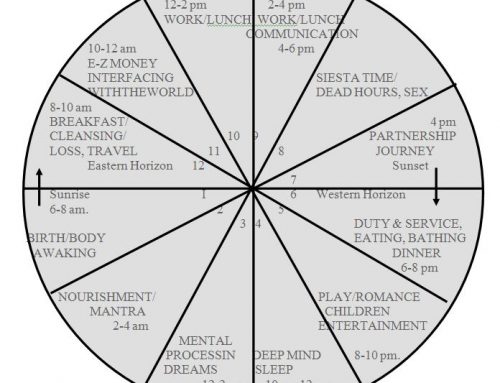In the Vedic tradition, seers called the modern age kali yuga– the ‘age of discord’. The word kali (not to be confused with the goddess Kālī) means strife or quarrel, and the major cause of it is the battle over Space- both the space outside us- the environment and its resources- as well as the space in our bodies and minds. The word for ‘good space’ in Sanskrit is sukha. Sukha also means happiness. When you have good space in your body, such as when your bowels and lymph are moving regularly, it is easier to be ‘happy’ than when you are constipated and your digestion is backed up. This is not good space in the body, and leads to the opposite of sukha- duhkha.
To win the inner space battle, Ayurveda recommends fasting, pancha karma, and other ways to promote a hospitable microbiome- the totality of microorganisms living on your inner and outer skin, which regulate everything from digestion and metabolism to hormones and immunity. Unfortunately, this inner environment is bombarded by terrorists and enemies in the form of poor food combinations, exposure to antibiotics, bad lifestyle choices, and more. Our microbiome is under attack, the first casualty in a battle for good space on the level of our bodies, and Āyurveda is the art and science that can teach us how to restore it.
One easy technique is to avoid snacking between meals. Think of your GI tract like a dishwasher- once the door is shut, you don’t open it mid-cycle to add more dirty dishes, right? Do the same with food; once you’re done, close your mouth and keep it that way until your digestive cycle has finished. How will you know? Give it 4-6 hours, or take the breath test: if you are still burping your previous meal, the cycle light is still red.
In Vāstu Shāstra- the Vedic art and science of creating harmony in the environment- the brahmasthāna holds a special place of importance. Bhrahma Sthāna means place of spirit. The rule says that the center of any lot, house, room, or artistic composition should be free, open and uncluttered in order to invite prosperity, love, and divine inspiration. Put a staircase, furnace, or heavy couches on the place of spirit and you effectively block the flow of life force to that dwelling, inviting stagnation, depression, and worse. Āyurveda borrows this concept and says that since the body is the dwelling-place of the soul, it too should have its center empty in order to confer ‘prosperity’ in the form of good health and vitality to the person. We all come with pre-built brahmasthānas, externally indicated by the depression of our navels, and internally consisting of our GI tract.
“We all come with pre-built brahmasthānas, externally indicated by the depression of our navels, and internally consisting of our GI tract.”
Yoga, Vastu and Ayurveda’s sister science, also appreciates this principle, and Patanjali defines yoga thus: yogash chitta vritti nirodhaḥ– yoga is cessation of the fluctuations of the mind stuff. This mind stuff isn’t just the grey matter between your ears, but the stuff between your heart and pelvis-, the entire digestive system. In modern science we know that the gut has a brain of its own and is responsible for up to 95% of serotonin production and 70% of our entire immune system.
Our digestive organs, including the villi in our intestines, work in a wavelike manner to process and push food through the system. These waves are called vrittis, and the cessation of all vrittis is the purported goal of yoga. As a result, yogis made fasting into an art, and fasting is a staple of practically every religion on the planet. Jesus fasted, Buddha fasted, Mohammed fasted, Moses fasted. Fasting is a core religious ritual because it brings us closer to God—our own brahmasthāna, or sacred space. Even the wise Benjamin Franklin said, “The best of all medicines is resting and fasting.” Keep your space uncluttered and its center empty, and you will invite God into your body and home.
Tithing Your Time
Creating space in your body and environment is the first step; the next is making space in your social and spiritual schedule. Various religious traditions talk about tithing a portion of your wealth, which is well known- but you can do the same with your time. In the space of a 24 hour day, honoring the brahmasthāna means leaving a portion of that time ‘empty’ and ‘uncluttered̍.’ Not watching TV or napping- just quiet, wakeful attention, what we call meditation or prayer. How much should one tithe? Ten percent is the usual rate. Ten percent of 24 hours is 2.4 hours- which may seem quite a lot to someone new to this. Even 5% – 72 minutes- may be too much. Beginners can start with tithing just 1% of their day- about 15 minutes- sitting in quiet, undisturbed meditation, working up to the full 10% as sitting becomes easier and the mind more still.
One of the best ways to divide this tithing time is into AM and PM- Active Meditation and Passive Meditation. For the “active” portion you can do mantras, rituals, prayers, songs, and any other form of engaged spiritual practice. During the “passive” phase, you do the opposite, letting God or Spirit do the talking. Simple So-Hum meditation or Vipashyana (Vipassana)-style practice is best for Passive Meditation. When we pray we talk to God- by sitting quietly we listen, using the silence between breaths to tune in to the divine.
So, how does one incorporate AM/PM into daily life? In the morning, you can start with yoga and prānāyāma- both forms of Active Meditation, which can naturally segue into Passive Meditation as your body becomes still and you sit to watch your breath. Shavāsana– corpse pose- is an example of built-in PM after a yoga class. If you don’t have time to fully do both in one sitting, try splitting AM and PM into, well, the A.M. and P.M. hours. This way you can balance your spiritual life between talking and listening- and just as in daily life, being a good listener is equally as important as being a good communicator.
“Balance your spiritual life between talking and listening- just as in daily life, being a good listener is equally as important as being a good communicator.”
What’s the benefit of this type of tithing? Like having an empty center in your home or body, entertaining emptiness in the mind is one of the smartest things you can do for mental health and rejuvenation. Nature abhors a vacuum; by creating one, you invite inspiration and creativity in your life.
In Vedic Astrology, upāyas are remedial measures- something you do to improve desirable and ward off undesirable life circumstances. In a sense, we do upāyas every day by brushing our teeth and bathing- both of which help us look attractive and avoid ill health. But upāyas are also additional remedies designed to find solutions where there are no obvious answers. By doing AM and PM practices I’ve been filled with the best ideas in my life- ideas that have become upāyas, remedial measures for navigating the Kali Yuga– the dark age of material civilization. Here’s to your brahma sthāna, and 15 minutes of silence.
FOR MORE WAYS TO RECONNECT WITH YOUR SPIRITUAL CENTER, VISIT:








